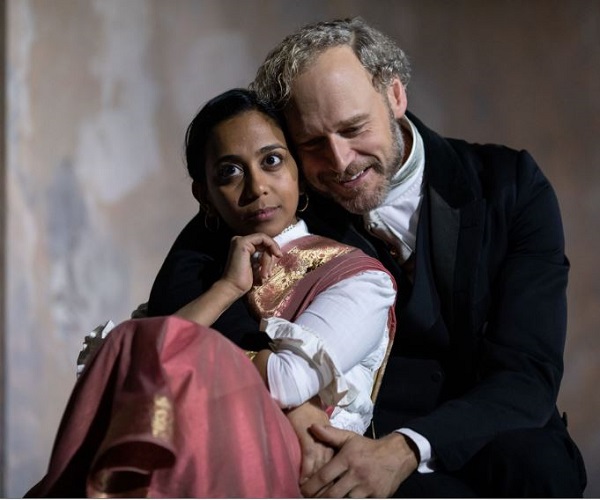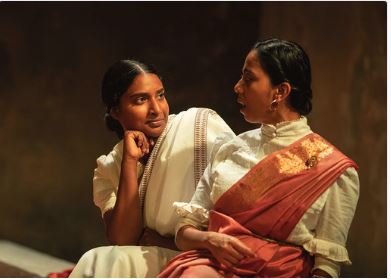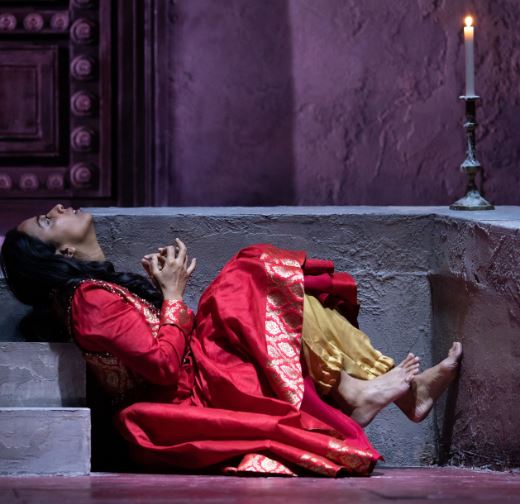A Universal Tale About Male Power Becomes A Slightly Hectoring History Lesson
Liz Vercoe reviews the Lyric Hammersmith's new version of Ibsen's A Doll's House

Photos by Helen Maybanks
Norwegian dramatist Henrik Ibsen's 1879 play A Doll's House took a long, hard look at the inequalities between men and women in what was then modern society. He gave particular scrutiny to marriage, as he had seen his mother sacrifice herself to his father, even through financial ruin.
Like Shakespeare's work, the play has survived the test of time because decade after decade we have seen its relevance, with a man blind to his own innate sense of superiority over a woman, in this case his beautiful wife, and a woman fighting to suppress the person she really is in order to behave as society expects.
It's a message that can shine a light on relationships in the home, the workplace and in different societies. Not even just about men and women, it is about the strong lording it over the weaker. We get that. It touches the universal.
So Tanika Gupta's recent adaptation, which re-sets the same story in 1879 Calcutta, seems not to add a great deal and maybe even detract. As in Ibsen's play a man is madly in love with his wife, who plays the submissive, seductive helpmate. He assumes she can't think for herself, when in reality she has gone out of her way to save him. As a result she has a secret which, when revealed, he can only see as affecting his status "as a man".
It could have been an Indian man of high caste lording it over his wife in a direct and interesting take on Ibsen, but this version of the story, directed by Rachel O'Riordan, is interlaced with reference to the Empire-building British, lording it over all Indians. We have British Tom (played convincingly by Elliot Cowan) braving the expats' ire to marry his "little palm squirrel" local girl Niru (Anjana Vasan), all simpering squeals of laughter and doe eyes.
Best friend and regular house visitor is Dr Rank (Colin Tierny) who, along with expressing his world weariness and hiding his tightly repressed love of Niru, opines on the pointlessness of British rule in India, the disgrace of PM Disraeli making Queen Victoria an Empress, the starvation rates alongside British-designed railroads, and the plundering of the country's resources. Yes this is historically true, but it's not possible to reduce the complexity of the effects of 19th century empire building to a few sound bites.
As a result, it's unclear if this is still a play making a social comment on marriage or class– "Class is not about money it's about breeding," says pompous Tom – or attempting a history lesson. But a history lesson without any context, for example incorporating India's own class system at the time, the caste system from untouchable Dalits up to Brahmins, and its effect on women.

The system would certainly have made it harder for Niru to find reasonable work as a divorced or separated woman even compared with Scandinavia in 1879. Her maid Uma (Arinder Sadhra) has had to abandon her children in order to work for her, while her widowed schoolfriend Mrs Lahiri, played with convincing dignity by Tripti Tripauaneni is desperately asking Niru to get Tom to give her work. Completing the unhappy characters of the play is Assad Zaman as fallen-on-hard times Das who also just wants to survive.
Still, the exotic courtyard set is glorious, and lighting designer Kevin Treacy achieves a highlight of the play when it becomes monochrome grey except for the blazing red of Niru's costume as she falls like a broken puppet. All in all, though, Ibsen's gloomy but timeless play feels unnecessarily hijacked.

A Doll's House runs till 5 October. Find out more and book tickets here or call the box office on 020 8741 6850.
September 20, 2019